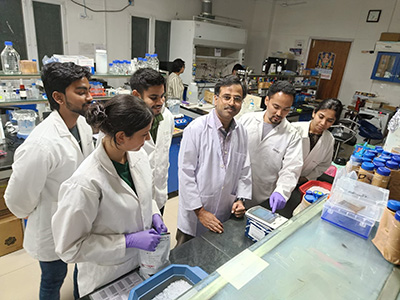Mandi: Researchers at the Indian Institute of Technology Mandi have achieved a breakthrough in the development of vaccines targeting the pork tapeworm (T. solium).
This tapeworm is responsible for both intestinal infections and the more severe brain infection leading to seizures.
They collaborated with scientists from Dayanand Medical College and Hospital in Punjab and the CSIR-Institute for Himalayan Bioresource Technology in Himachal Pradesh.
The team under the leadership of Dr. Amit Prasad, an Associate Professor in the School of Biosciences and Bioengineering, has introduced an innovative and efficient approach to vaccine production for challenging infectious diseases.
The World Health Organization (WHO) identifies the pork tapeworm as a major contributor to foodborne deaths and a leading cause of epilepsy, particularly in developing nations.
In North India, the prevalence of brain infections caused by this tapeworm is alarmingly high at 48.3%.
WHO's "2030 Roadmap of Priority Neglected Tropical Diseases" aims to combat T. solium and similar infections affecting 1.5 billion people globally.
The conventional method of mass deworming drug administration, using drugs like Albendazole and Praziquantel, has faced challenges, including reduced public participation and an increased risk of drug resistance. Consequently, it has fallen short of achieving desired outcomes.
Dr. Amit Prasad stressed the urgent need for a vaccine to protect people against the pork tapeworm.
Traditionally, tapeworm vaccines have been developed from products or antigens derived from tapeworm eggs or larvae, which can be unreliable and time-consuming.
Injecting the entire tapeworm or parts of it into the human body is neither safe nor practical. A safer approach involves injecting specific protein fragments from the tapeworm, minimizing side effects and preventing the tapeworm from developing resistance to the vaccine.
Identifying the right protein fragment with strong vaccination potential has traditionally been a painstaking process.
To expedite progress, IIT Mandi researchers employed a combination of protein studies and bioinformatics.
Dr. Amit Prasad explained, "First, we identified specific antigens from the tapeworm's cyst fluid that trigger an immune response. We then analyzed these antigens using immune-informatics tools to identify safe and effective protein fragments. These fragments were combined to create a multi-part vaccine, considering factors such as size, stability, and compatibility with the immune system."
The researchers found that the vaccine interacted effectively with immune receptors and is expected to stimulate the body's defense system efficiently.
This research sets the stage for developing vaccines against neglected tropical diseases caused by similar parasites in the future.
Further animal and clinical studies are required to assess the safety and efficacy of this promising vaccine candidate.
The integration of protein studies with bioinformatics represents a groundbreaking approach to identifying potential protein-based vaccines in a cost-effective and timely manner.
This effort holds promise for combating neurocysticercosis and serves as a model for addressing other neglected tropical diseases.
The research findings have been published in the Journal of Cellular Biochemistry in the United States, with co-authors including Dr. Rimanpreet Kaur, Prof. Gagandeep Singh, Dr. Naina Arora, Dr. Rajiv Kumar, Mr. Suraj S. Rawat, and Dr. Amit Prasad.







